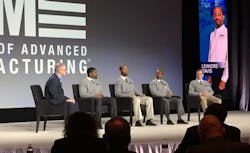One of the toughest challenges manufacturers face today and into the future is a serious skills gap in the technical workforce. “No matter where you are, there’s a war for talent,” said Chris Layden, vice president of ManpowerGroup. “You are fighting for talent all around the world.”
With so many Baby Boomers reaching retirement age, 20 percent of the workforce will retire over the next eight years, according to Layden. Some 2 million manufacturing jobs will go unfilled by 2025. A skills mismatch means more training will be required, it will take longer to fill positions, and costs to fill those slots will go up, he added.
“On top of all of this, there is a rapid skills revolution happening in manufacturing,” Layden said. “New skills will be required in the next two years. Most employers are not even able to define yet what those skills are.”
In a program aimed at making a dent in the skills gap by matching people with adjacent skills that can be developed and applied to new roles, ManpowerGroup teamed up with Rockwell Automation to create a program for U.S. military veterans to secure high-paying jobs in manufacturing. This week in Houston, Rockwell Automation introduced a handful of the first graduates of the Academy of Advanced Manufacturing (AAM) to attendees of Automation Perspectives, a media event leading up to Automation Fair.
The 12-week program launched in August combines classroom learning with hands-on laboratory experience. Veterans are trained in Rockwell Automation’s state-of-the art facility in Mayfield Heights, Ohio, for in-demand jobs in advanced manufacturing.
“Basically, the typical day is a combination of hands-on lab work, which is supported by presentations—very intensive, very fast-moving presentations of materials and theory,” said Scott Bingham, one of the graduates. “We’ll be able to support day-to-day operations once we would get into our job opportunities. They teach us: This is what you’ll see in field; this is what could happen.”
Many of the graduates do come with some level of adjacent skills from their time in the military, which has helped them pick up the material quickly. “Besides basic electrical and mechanical skills, I didn’t have any idea what to expect,” said Dre Davis, another AAM grad. “But I feel like I picked things up pretty fast.
Having people comfortable with the technology that will enable the next level of productivity is so important as industry moves into the future, said Blake Moret, president and CEO of Rockwell Automation. Being able to bring military veterans up to speed to fill these advanced manufacturing roles is a boon for industry.
“There’s a huge need and a huge opportunity to be able to take advantage of the skills that veterans can offer as they leave the service of the country and return to civilian life,” Moret said. “So many of the core work skills are already embodied in those veterans. We’re starting with great raw material, if you will—people who under the most intense conditions possible have learned how to do a job and work with others to create successful outcomes.”
What veterans also have is grit, contends Mike Carroll, vice president of innovation for Georgia-Pacific. During the Pulp and Paper Forum at Automation Fair later in the week, Carroll took the opportunity to evangelize about the cultural changes needed in manufacturing to survive the digital age. He also sang the praises of this program, which is helping Georgia-Pacific overcome its own problems with the skills gap.
“So far, we have not found a single person in that program who is not acceptable,” Carroll said. “That experiment proves that it works and it’s true. I think it’s a great thing, and they could use your support.”
It seems the pulp and paper industry has indeed been supportive of the first round of AAM graduates. “I just accepted an offer with a paper manufacturer down south to be a process optimization specialist,” said Travis Tolbert, U.S. Navy veteran and academy graduate. It’s a new position created as part of a factory-of-the-future initiative, he added.
Davis is in his second round of interviews with a paper mill in Alabama, and Allison is also in the final interview stages with a paper mill in Texas for a position as an electrical controls engineer.
Bingham has accepted an offer from an energy industry OEM—also a created position, he said. “It’s tailor-made for a person coming out of a program such as this,” he added. “I will be able to hit the ground running.”
Every veteran that joins the program is guaranteed a job upon completion. All 14 graduates in the pilot program have job offers now or are in their final interview stages. More than half of the graduates have multiple job offers that significantly increase—some graduates even doubling—their previous salaries.
That’s 14 jobs for the first round of graduates, but Rockwell plans to expand that to hundreds in the coming year. “We want to create a program that has the capacity to graduate up to 1,000 veterans a year,” Moret said.
The graduates on stage urged other veterans to take advantage of the program. “I would challenge any of my veteran brothers and sisters to challenge themselves to change their lives,” Bingham said. “That’s exactly what happened to me.”
Added Chris Allison, “It’s the best decision I’ve made, other than serving my country.”
About the Author
Aaron Hand
Editor-in-Chief, ProFood World

Leaders relevant to this article:
